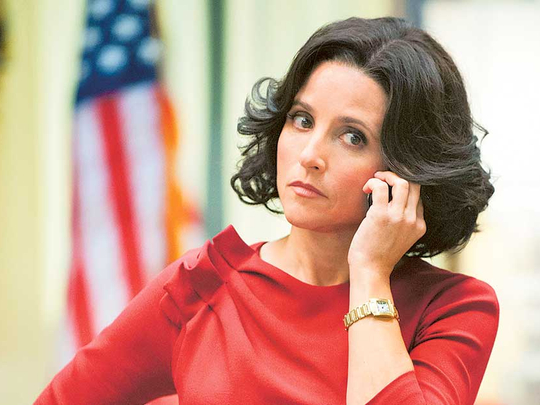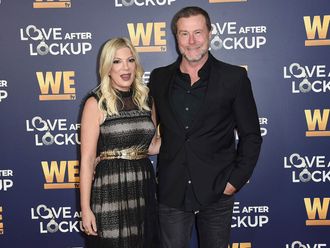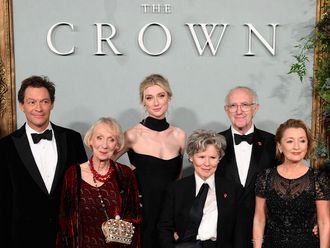
A female politician in the fight of her life as she strives to make White House history. A nation in the balance as its officials contend with an arcane electoral system that varies from state to state. A proud republic debased by a presidential campaign fixated on minor gaffes and riddled with filthy language.
So begins a new year of Veep, the HBO comedy that offers satirical refuge from governmental gridlock and democratic despair with its depiction of a fictional if familiarly dysfunctional Washington, led by President Selina Meyer, the ambitious and vulgar former vice-president, played by Julia Louis-Dreyfus.
As Veep, which with eerie prescience has anticipated real-life political embarrassments in the United States and around the world, begins its fifth season on April 24 (it screens in the UAE on April 25 at 10pm on OSN HBO, although it’s available at the same time as the US on OSN Play), it finds President Meyer in ever more farcically frustrating territory: stuck in an Electoral College tie with a rival candidate, she must continue to govern while she and her Oval Office colleagues try to steer a Byzantine recount process in her favour.
Veep has been a career pinnacle for Louis-Dreyfus, who last year won her fourth consecutive Emmy Award for playing Meyer. (The series itself won its first Emmy for outstanding comedy.) These achievements are a testament to the enduring popularity of the actress, who starred previously on Seinfeld and The New Adventures of Old Christine, and who has found a longevity that is rare for female TV stars (and male ones, too).
On April 11, Louis-Dreyfus, 55, who was in New York to host the April 16 broadcast of Saturday Night Live (where she spent a few exasperating years as a cast member in the 1980s), was seated in the lobby lounge of the Ritz-Carlton Hotel, dressed in workout clothes and rectangular eyeglasses and sipping coffee as she spoke about her and her characters’ ascents.
In these excerpts from that conversation, Louis-Dreyfus discussed her time on Veep and its lessons for the 2016 race; the sexism she sees in Washington and in Hollywood; and how she is still learning to swear like a proper US president.
This will be the second season of Veep in which Selina Meyer has actually been the president of the United States. Where can the show possibly go from here?
Originally, when Armando [Iannucci, the Veep creator and former showrunner] said, “What do you think? Let’s make her president,” I was like, yeah, sure, that sounds cool. And then after we’d done it, we were like, we just painted ourselves into this corner. But what’s good about this situation, comedically, is that even though she becomes president, it’s eluding her. She has not a moment to revel in this so-called accomplishment, which she got by default. She has to immediately campaign for the position. She has to quickly figure out some sort of legacy that she can create for herself. So it seems as if everything is just a grab away for this poor, ridiculous woman.
So her holding the highest office in the land hasn’t changed the show’s basic premise?
Well, nothing is as it seems, right? Frankly, look at Obama and his Supreme Court nominee. He’s ostensibly the most powerful person in the world and look how he’s being stymied. And that’s a grand and noble [duty]. We don’t do that kind of thing on our show. We’re anti-grand and anti-noble.
Do you think Selina has any positive qualities?
I think that SHE thinks she does. She is somebody who believes, very much, that she has something to offer. I identify with her as a woman thwarted. Who she was thwarted by remains to be seen. You could make the argument that she did it to herself. But you have to go into these things having sympathy for even the most venal person if you’re going to play them.
Has her poetically obscene vocabulary infiltrated your own?
You mean, do I swear myself? I can’t say that I, myself, am a big swearer. I’m not an eloquent swearer. I don’t have that flowery, yummy language right at my fingertips. Let’s say I’m much quicker to go to words that I dare not say in this interview. I say them with abandon now.
Does it startle you when you see real-life politics replicating absurd things you’ve done on Veep?
It does freak me out, particularly when you see where this season is going. Certainly, some of the material that’s out there, that’s happening as we speak, if we put that into a script we might get notes back from HBO saying, “It’s too broad.”
The prime minister of Australia, Malcolm Turnbull, copied one of the show’s campaign slogans almost word for word.
Unwittingly. We were “Continuity With Change,” he was “Continuity and Change.” We tried to come up with the most banal, vacuous, meaningless piece of [garbage] slogan. He used “and,” so maybe that somehow makes it more palatable.
As you watch Hillary Clinton run for president, do you see her contend with plights that are similar to Selina’s?
Yes, of course, but I see it all over the place. With all female officials. Be it [House Democratic Leader Nancy] Pelosi, be it [senator] Barbara Boxer. [senator Elizabeth] Warren. Be it [Supreme Court Justice] Ruth Bader Ginsburg. I watch these ladies with an eye — just thinking about this show. But not in a sense of parody. It’s just interesting to watch behaviour, people’s reactions to women in power. A stern, decisive man is appealing. There are those who would say a stern, decisive woman is unappealing. Need you know any more than that?
Does that affect the way you play her on the show?
No, it doesn’t. I wouldn’t vote for Selina Meyer, let’s just put it that way.
You’re an executive producer on Veep. Do you think you are sometimes held to this same double standard?
As a person in power, within the show? I am to a certain extent. I’ve got to talk myself down sometimes, but I don’t give into it. I try very hard to not shy away from asserting myself if I feel strongly about something. I try to be as kind and pleasant as possible. But I’m pretty sure that people would say I assert myself.
Are there any lessons that Clinton can take from your show?
I think Selina’s experiences are just a playbook in what not to do. I guess she could look to that and say: “OK, great, I didn’t do that. So I’m ahead.”
Did you feel for her, when, a few days ago, it took her several swipes of a MetroCard to get past a New York City subway turnstile?
That’s a perfect Veep moment. The fact of it being so put under the magnifying glass and blown up was so bizarre. It was stupid and crazy.
What should she do when she gets caught in a moment like that?
[Folding hands in resignation] I mean, what can she do in that moment? The card didn’t work. She’s got to try to have a sense of humour about it. I suppose you can make a self-deprecating remark. But it has to be innate. The minute there’s any falseness in your behaviour, that will be picked up on.
Have you decided which presidential candidate you’re supporting in 2016?
Whoever the Democrat is. Period. End of story.
Could you reconcile yourself to a Trump presidency, simply as a four-year gold mine for comedy?
I can’t go there yet. I really can’t. When he was talking about abortion rights, and who’s punishable, it reminded me of an episode we did on abortion. The backpedaling that he was trying to master — I say in quotes — Selina was trying to do that same thing. He’s more in one camp than the other, although he used to be in the other camp, where Selina was trying to say both things at once, so as not to lose a certain part of the electorate. I find it just horrifying and funny and also embarrassing.
As we speak, you’re preparing to host Saturday Night Live. Do you look back fondly on your years there as a cast member?
Fondly-ish.
Because women on the show in that era were not given equal treatment?
At all. I did not come out of SNL as any kind of name. I didn’t do anything particularly great when I was there. I didn’t. It’s fine. But I learned a tremendous amount. It was a very sexist environment. Since I’ve gone back, I can tell you it’s much more of an equal-opportunity environment.
What did you gain from your experience there?
I was on it for three years, and when I left, I made this conscious decision that I would not take any jobs that didn’t seem as if they would be really fun. That’s very simplistic and Pollyannaish sounding, but really, I noted that. I’m not doing this unless I can have a deep sense of happiness while doing it. I’ve applied that, moving forward, and it’s worked. So in that sense, I have SNL to thank.
You appeared with Tina Fey in a recent, popular sketch on Inside Amy Schumer, about women aging out of Hollywood’s narrow boundaries for desirability. Did you bond during that experience?
Saturday Night Live is like its own university. Once you’ve been there, there is a kinship with everyone who’s been there and everyone who is there. Your eyes lock and you both know that you have this in common. Tina and Amy [Poehler] and I are friends. I met them both when I hosted, and we’ve been in touch since then. I like those guys. I feel a connection to them.
Do you take pride in playing a lead female TV character who’s over the age of 30?
I don’t think of it like that. I’m happy to have a job. Really, I’m not kidding. I’m certainly happy to be playing a woman in a powerful position in politics, even though she’s a buffoon. And I don’t say that apologetically, because think of all the buffoons in politics right now. She’s our buffoon.
You’ve been a TV comedy star for more than 25 years, across three different shows. Do you feel that you’ve been a pioneer for other women? Do you wish there were more opportunities for your female peers?
I don’t think of myself as a pioneer. I’m not sure that I am. Opportunity for women in television has increased. It’s because the landscape has widened. More women got on the playing field. But opportunity for women in film has not increased. I just think it’s that simple. By the way, I’m certain that there’s more much more in television that can be done. And I’m trying to do it. But I’ve certainly seen it change in my lifetime.
Do you have ambitions outside of acting?
I’d like to become a better knitter. There was a period of time where I was knitting hats a lot, and I would like to get back to that. I found it really relaxing.
What about running for office?
No, I could never do it. Not in a million years. My father keeps saying, “I want you to run for Senate.” But that’s just my dad.













